Table of Contents
Every believer has an anointing (1 John 2:20) and shares in Christ’s royal Priesthood (1 Peter 2:9).
The consecration of the priests is described at the beginning of Exodus 29. The Hebrew word for “consecrate” means “to fill” or “fill the hand.” It was God’s intent that the priesthood would “fill” themselves with the work God set aside for them. The consecration ceremony was designed to physically demonstrate that.
Exodus 29
God gave Moses a list of items to be sacrificed or used in the ordination process. Each thing on God’s list foreshadowed Jesus. Only He can wash you clean of your sin and ordain you as a priest for Him.
The consecration of the priests is described at the beginning of Exodus 29. The Hebrew word for “consecrate” means “to fill” or “fill the hand.” It was God’s intent that the priesthood would “fill” themselves with the work God set aside for them. The consecration ceremony was designed to physically demonstrate that.
Vs. 7: Anoint Priests
Priests must be anointed. The oil (a representation of the Holy Spirit) was poured over their heads, indicating that it was given in great measure, not in small measure (Psalm 133:2).
Like these ancient priests, every believer has an anointing (1 John 2:20) that they may receive and walk in by faith.
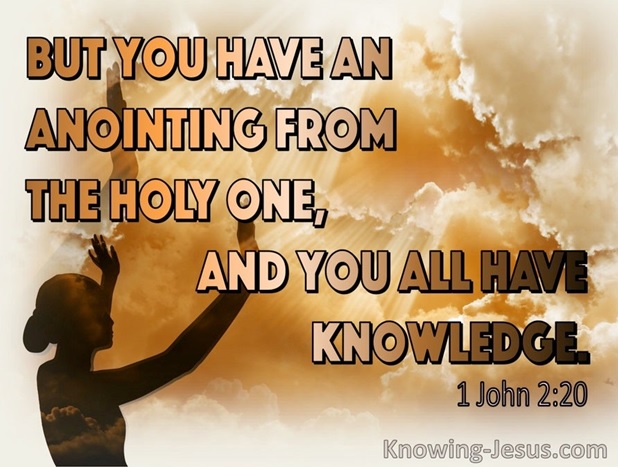
The anointing oil is the oil mentioned in Exodus 25:6, glanced at in Exodus 28:41 and its composition is in Exodus 30:23-25.
In the early Church, the consecrated oil was considered a special sign of the presence of the Holy Spirit, who communicates himself to us as a gift from Christ.
The anointing oil is to be poured upon their heads, as the ritual typified cleansing from sin. So, the anointing was emblematic of the outpouring of Divine grace upon the person anointed. The pouring of the oil on Aaron’s head was perhaps to indicate the freeness and abundance with which God gives His grace to His servants. (Psalm 133:2.)
John Wesley wrote, “The high priest was to be anointed with the holy anointing oil – That the church might be filled with the sweet favor of his administrations, and in token of the pouring out of the Spirit upon him, to qualify him for his work.” 1
In 1 John 2:20, the Apostle John reassures true believers that they have been anointed by Christ and possess knowledge of the truth. In 1 John chapter 2, we discover a ministry of the Holy Spirit not mentioned elsewhere in Scripture – His anointing.
Christ’s anointing corresponds with His indwelling ministry, which takes place at the moment of salvation. The Spirit’s indwelling ministry is necessary for every other office He undertakes in a believer’s life.
This anointing referred to the Spirit of God being poured out by Jesus “the Holy One” on those who have come to faith in Christ. We receive this anointing from Jesus who abides in us” (1 John 2:27), meaning it was lasting.
We have the indwelling Holy Spirit. We are positioned in Christ, by faith in Him. We have the mind of Christ. The Bible passage considered to be the basis of this belief is 1 Peter 2:9.
1 Peter 2:9
1 Peter 2:9 – But you are a chosen race, a royal Priesthood, a Holy Nation, a people for God’s own possession, so that you may proclaim the excellencies of Him who has called you out of darkness into His marvelous light (NASB)
The doctrine of the priesthood of all believers states that all believers in Christ share in his priestly status; therefore, there is no special class of people who mediate the knowledge, presence, and forgiveness of Christ to the rest of believers, and all believers have the right and authority to read, interpret, and apply the teachings of Scripture.
According to Cardinal Levada’s glossary, 2 Catholics distinguish between the priesthood of the faithful and the ministerial priesthood.
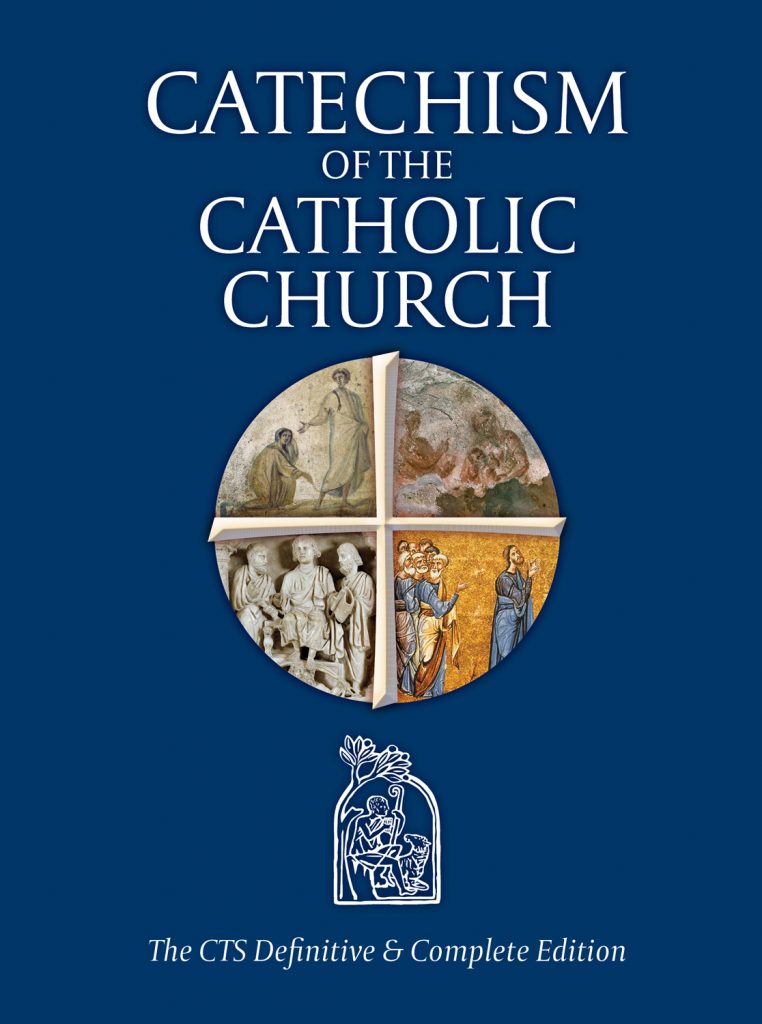
In a sense we are all priests. But this title is not what bestows the power to forgive sins. God sent Jesus to forgive sins, and Jesus conferred the power to forgive sins on the apostles when He said, “‘As the Father has sent me, even so I send you.’ And when He had said this, he breathed on them, and said to them, ‘Receive the Holy Spirit. If you forgive the sins of any, they are forgiven; if you retain the sins of any, they are retained’” (John 20:21-23). This power to forgive sins has been passed on to the apostles’ successors and to priests ordained to the ministerial priesthood through the sacrament of holy orders.
Summary of the Doctrine of the Priesthood of All Believers
In contrast to the beliefs of the medieval church, the Protestant doctrine of the priesthood of all believers holds that there is no longer a priestly class of people within God’s people, but that all believers share in Christ’s priestly status by virtue of their union with Christ. Although there was a select group of priests in the Old Testiment, beginning with Aaron, Moses’ brother (Exodus 29:7), who mediated the knowledge, presence, and forgiveness of God to the rest of Israel, Christ has come and fulfilled the priestly role through his life, death, and resurrection.
Therefore, Christ was the final priestly mediator between God and his people, and Christians share in that role through him. This means that Christians are not dependent upon the priests within the church to interpret Scripture for them or affect God’s blessing of forgiveness for them; all Christians are equally priests through Christ and stand upon the same ground before the cross.
Medieval Views vs. Protestant Understandings
Medieval theologians believed that salvation came from God through the church. In these simple terms, this sounds very similar to the way most Christians understand it. There are, however, significant differences between medieval and Protestant understandings of how God works through the church.
The medieval church taught that God works exclusively through a select class of priests as they administered the seven sacraments of the church: baptism, the Eucharist (Lord’s Supper), confirmation, penance, anointment, marriage, and holy orders. Protestants, on the other hand, believe that all people in the church are priests, or in the language of the 16th century reformer, Martin Luther, the priesthood of all believers.
The medieval view rests on the teaching of church tradition whereas the Protestant view grows out of Scripture.
Medieval Christians believed that the church was part of a celestial hierarchy where everything in the heavens and earth had its place in a great chain of being. The great chain begins with God. God passes his knowledge and grace down the chain to the archangels, then angels, who in turn invest this information in the sacraments, and those who administer the sacraments (priests), who then give them to the laity.
This view of a hierarchy prevailed in the church through the Middle Ages until the 16th century Protestant Reformation. Luther challenged this prevailing notion because he rejected the church’s claims; he believed the church rested its idea of the unique priestly class on tradition rather than the authority of Scripture.
Luther instead believed that offering the sacrifice of the mass did not make one a priest but rather anyone who had faith in Christ, our great high priest, was indeed a priest of God. In Luther’s typical pithy manner, he claimed: “Faith alone is the true priestly office.” Luther’s idea of the priesthood of all believers versus the priesthood of only a select few rests in the priestly office of Christ and in the believer’s blessing to share in all that Christ is through union with him.
In His baptism, God anointed Jesus with the Holy Spirit to carry out his threefold office of prophet, priest, and king (Luke 3:1–21; Matthew 3:1–17; Mark 1:1–11). Likewise, we who are in union with Christ share in this same anointing through Christ’s outpouring of the Spirit upon the church (Acts 2:1–41, esp. 33, 38; cf. Galatians. 3:14). Through Christ’s priestly office, all believers who are united to Him share in His anointing.
1 Peter 2:9 teaches us, “But you are a chosen race, a royal priesthood, a holy nation, a people for God’s own possession, so that you may proclaim the excellencies of Him who has called you out of darkness into His marvelous light; (NASB)”
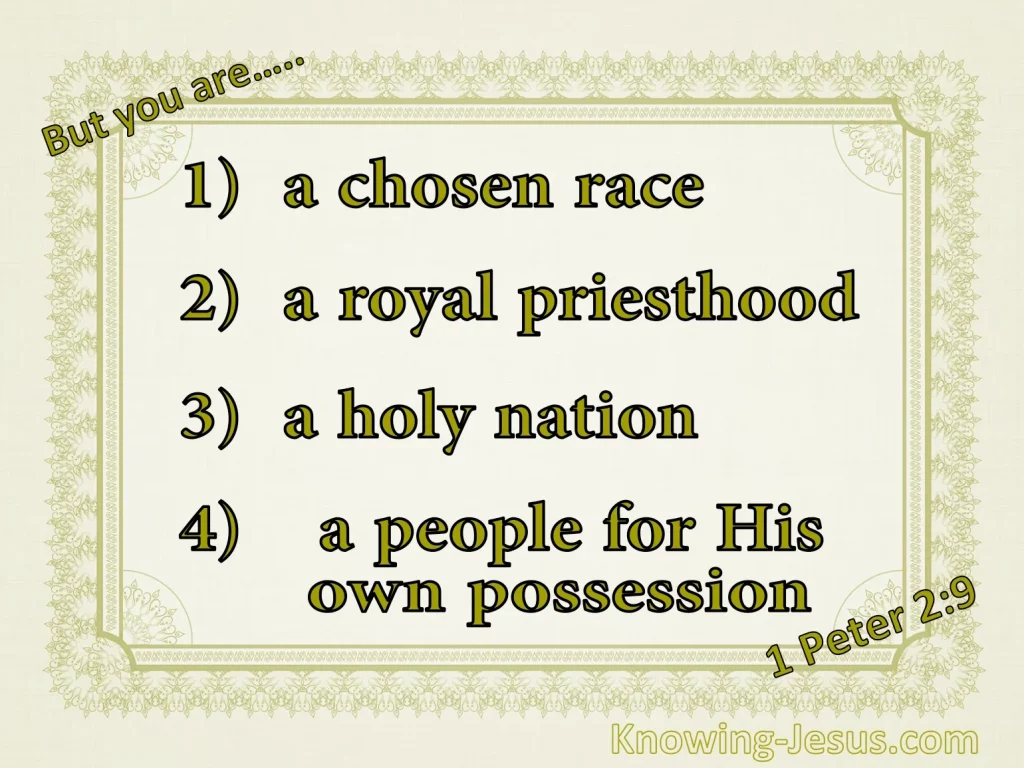
Within the context of Peter’s statement (1 Peter 2:9), Luther rests the church’s identity as a royal priesthood in their union with Christ. Our priestly office finds its fount and source in Christ’s priestly office – “you also, as living stones, are being built up as a spiritual house for a holy priesthood, to offer up spiritual sacrifices acceptable to God through Jesus Christ” (1 Peter 2:5, NASB).
The most significant blessing is that there is no hierarchy of beings (archangels, angels, archbishops, bishops, and priests) standing between the believer and God. Rather, we have union, communion, and fellowship with God through our great high priest, Jesus Christ.
As Christ taught his disciples, “For where two or three are gathered in my name, there am I among them” (Matthew 18:20).
Implications of the Doctrine of the Priesthood of All Believers
That all believers are priests means that not only ministers but also the person in the pew has the right and authority to read, interpret, and apply the teachings of the Bible. A caste of priests does not have this right. No longer must we place our implicit faith in the teaching of the church magisterium (the official teaching arm of the church), but like the Bereans in the days of the apostle Paul, we can learn immediately from the word of God and the instruction of the Holy Spirit (Acts 17:11).
Rejoice that because of your union with Christ you share in all who He is and does. In this case, his high priestly office means that you too are a holy and royal priest.
But for Luther, the seminal figure of the Protestant Reformation, the priesthood of all believers did not mean, “I am my own priest.” It meant rather: In the community of saints, God has so tempered the body that we are all priests to each other. We stand before God and intercede for one another, we proclaim God’s Word to one another and we celebrate his presence among us in worship, praise, and fellowship. Moreover, our priestly ministry does not terminate upon ourselves. It propels us into the world in service and witness.
John Calvin, the leading French Protestant reformer and the most important figure in the second generation of the Protestant Reformation, interpreted the priesthood of all believers in terms of the church’s participation in the threefold office of Christ as Prophet, King, and Priest. Specifically, every Christian is mandated to be a representative of Christ in his redemptive outreach to the world: “All believers … should seek to bring others into the church, and should strive to lead the wanderers back to the road, should stretch forth a hand to the fallen and should win over the outsiders.” In other words, the priesthood of believers is not a prerogative on which we can rest; it is a commission which sends us forth into the world to exercise a priestly ministry not for ourselves, but for others— “the outsiders”—not instead of Christ, to be sure, but for the sake of Christ and at His behest.
For Calvin, the priesthood of all believers was not only a spiritual privilege but a moral obligation and a personal vocation.
______________Affiliate link – SHOP: _______________
_This ad is for my favorite version of The Bible _
_____but click on it to go to the whole store______

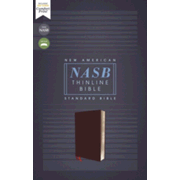
NASB Comfort Print Thinline Bible, Red Letter Edition–bonded leather, burgundy (click here)
By Zondervan
The beloved 1995 Edition of the New American Standard Bible is now easier to read with Zondervan’s exclusive NASB Comfort Print® typeface. This edition of the NASB Thinline Bibles is available in a variety of sophisticated designs in a portable, easy-to-read format.
- The full text of the New American Standard Bible, 1995 Edition
- Exquisite, durable covers
- Less than one inch thick
- Double-column format
- Presentation page
- Two satin ribbon markers
- Words of Christ in red
- Exclusive Zondervan NASB Comfort Print 9 point type
Features:
____________________________________________
Consider the Daily Bread email message sent on 1/28/2009 and 10/4/2023 which says,
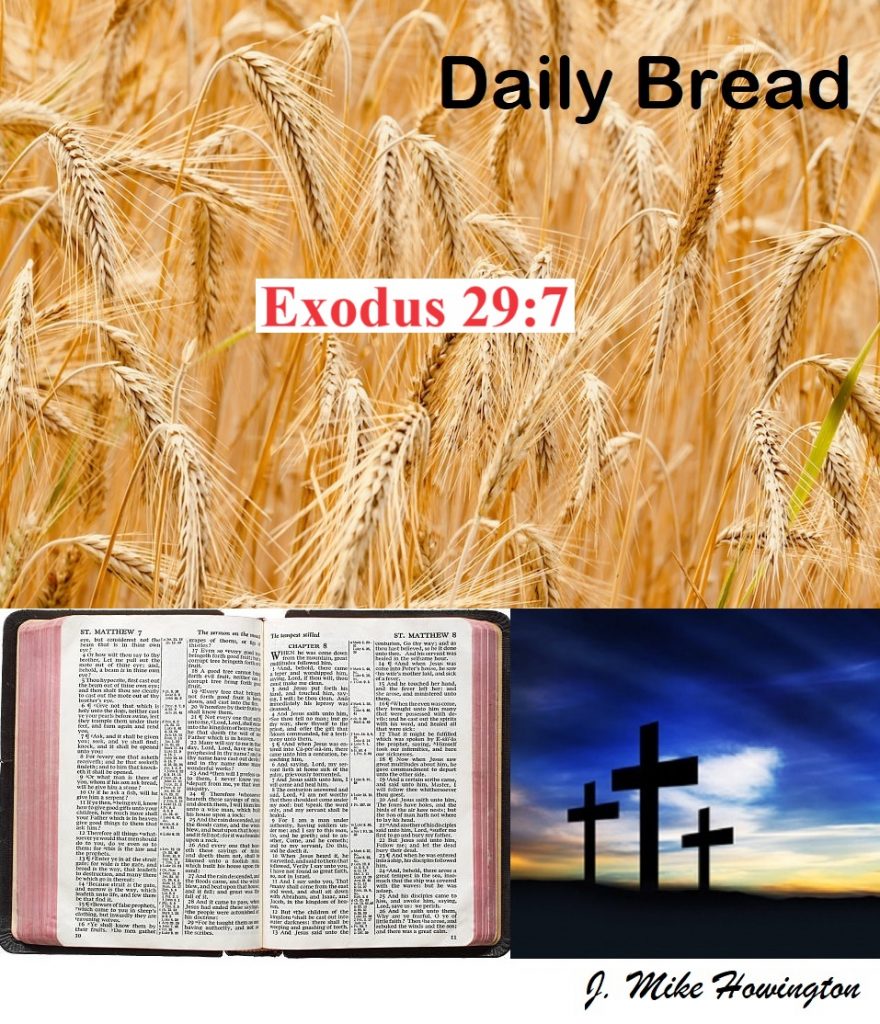
Exodus 29:7 – Then you shall take the anointing oil and pour it on his head and anoint him. (NASB)
The ordination ceremony of the very first high priest, Aaron, included a once-in-a-lifetime anointing. A large amount (Psalm 133:2) of the oil (representing the Holy Spirit) was poured over his head. 1 John 2:20 says that all us believers have that anointing that we receive and walk by faith.
You Can Receive The Daily Bread, for FREE.
To receive the Daily Bread email messages, free on Mon., Wed., and Fri., in your email inbox, just fill in the form below or send an email, and ask to be added, to jmikeh@jmhowington.com
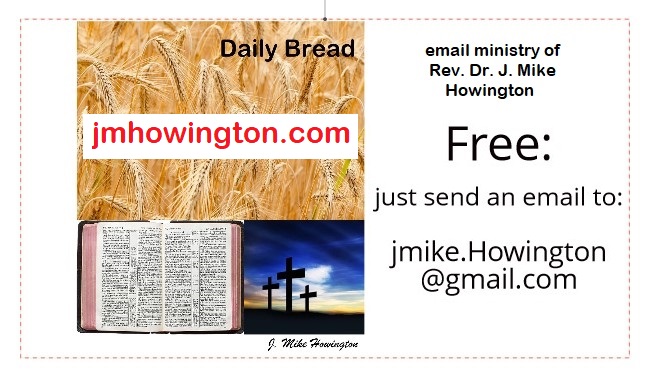
References:
- John Wesley, Wesley’s Notes, https://www.studylight.org/commentaries/eng/wen/exodus-29.html
- “According to Cardinal Levada’s glossary” refers to:
Catechism of the Catholic Church, (Vactican City, Italy: Vatican Publishing House, 1994), pg. 895
Table of Contents

Everything is very open with a very clear clarification of the challenges. It was really informative. Your site is extremely helpful. Thank you for sharing!